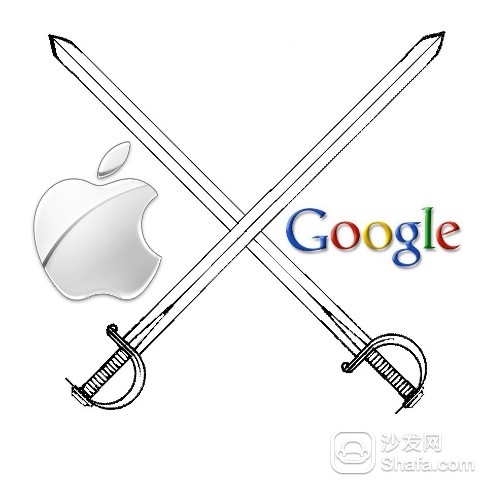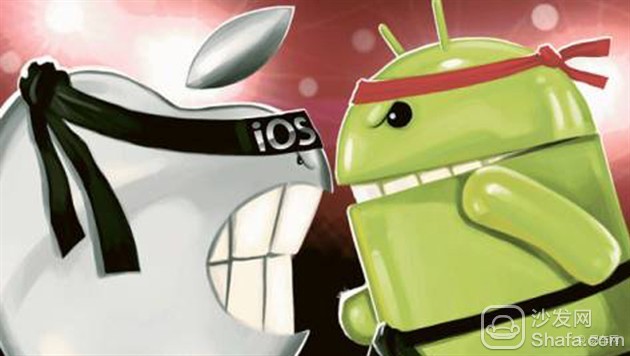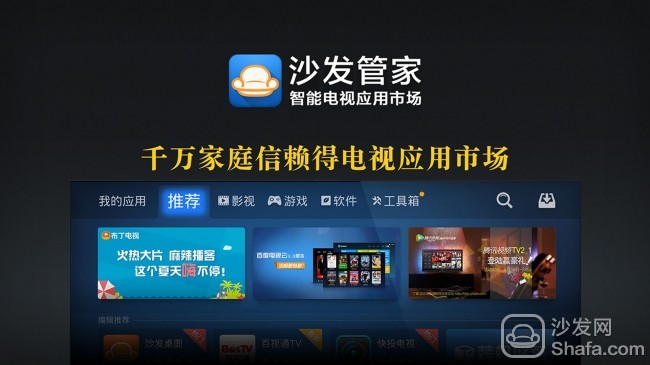Today, smart phones are becoming more and more important, and when we think of this market, we naturally think of two players: Apple on iOS and Google on Android. However, this kind of thinking will let us ignore a lot of details. In fact, Apple and Google are not only fighting on the battlefield of smart phones, but also competing in other fields. Despite this, both have achieved their success through their own strategies. Of course, these two heavyweight players face various challenges every day.
Google and Apple's grudge: Google's Android system occupies most of the market share, and Apple is also continuing efforts.
From the global smartphone market, mobile phones equipped with Google's Android system are much more than Apple's iOS. Android accounts for approximately 80% to 85% of the market, while iOS only accounts for 10% to 15%. In recent years, Android has seen explosive growth, while Apple has continued to shrink. It seems that Apple is like the scene of 2007 is gone forever.
In the smart phone operating system market share, Google is far ahead. However, many things are not as simple as the surface.
In the most recent quarter, Apple sold a total of 40 million iPhones, not only higher than the number of analysts predicted, but also more than the same period last year. Although it is not known for a moment what kind of feedback Apple's two mobile phones will use in the future, these figures show that the iPhone 6 and iPhone 6 Plus are selling well and are popular with people. Even Cooke publicly stated in October that these two are the best selling phones in Apple’s history. Obviously, Apple is trying its best to win people's favor.

In fact, Google and Apple are not direct competitors
Different profit models: We need to understand that Apple and Google are not a direct competitor on the battlefield of smart phones. Because the business model of the two is very different. Unlike Apple, Google does not sell mobile phones but makes money through search engine advertising services. For the Android operating system, it is used to occupy the mobile terminal to achieve strategic significance. Unlike Android's open source, closed iOS systems only work on Apple's hardware. Therefore, Apple's profit is through hardware, iOS system software and cloud services. Compared to Google, which collects user data, Apple, which does not collect data, is more likely to gain the trust of its partners in mobile payment products.
Different product positioning: Apple's product positioning is not compatible with Android phones, it chose to take the high-end line. Some people think that this will be Apple's biggest hidden danger. In fact, it seems that Apple has received good feedback worldwide. So far, Apple and Google have been kings in different fields. Google gains market share in most remote mountainous regions including low-end markets and continues to do its data collection and advertising services. While Apple takes the high-end route through the middle-class gold sucker.
In fact, Apple’s real competitor is an Android phone manufacturer, such as Samsung. Obviously, without Google's Android, it is impossible for Samsung and other handset makers to become competitors with Apple. The significance of Android in most of the smartphone market is that it unites its own hardware vendors. However, both companies will face an imminent threat.

Google and Apple’s Threats and Challenges
Apple's challenge
Apple's threat comes from closed iOS. Because of the closure, the small market share has dampened the enthusiasm of the APP openers and thus reduced the number of APPs. Although this has not happened so far. Today's software makers continue to make iOS applications, partly because iOS is easier to promote, and partly because iOS users are more lenient and willing to spend money on upgrading applications.
It is understood that Apple executives agree that market share is definitely not their ultimate goal. With regard to the current reduction in market share, executives also refused to respond.
Now Apple's solution is estimated to be making mid-range phones. This does not mean to reduce the quality of mobile phones, but to reduce some of the features and sell them cheaper. This is because people are powerless about the current price of Apple's mobile phones, and in addition to the old phones, Apple never discounts its phones. For example, Motorola took this strategy to win a certain market, and China's Xiaomi mobile phone is also successful because of this.
However, Apple’s product manager Greg Joswiak does not agree with this strategy. He said: "In the past, we have done such a thing and it almost caused a big mistake. We can't fall twice in the same pit. We believe that as long as we have a good product and interactive experience, we don't have a market. We hope to have a A healthy market continues to grow, not as a leader in market share."
Google’s threat
There are multiple Google threats. The first biggest threat came from Android handset manufacturers, such as Samsung, Asian mobile phone manufacturers and other low-end handset manufacturers. According to a survey conducted by market research firm Strategy Analytics, in the third quarter, Samsung’s share of global mobile phones was 24.7%, compared with 35% in the same quarter last year. In 2014, Samsung’s profits have shrunk, and it is predicted that it will continue to decline in the next three years. Therefore, Samsung began to cut off some smart phone business and began mass layoffs.
The second threat is that more and more manufacturers are starting to use open source and free Android versions. There are no Google applications in these phones. It is estimated that these phones will hit 20% of the total, and this will cut off its financial path.
In fact, it's not so simple for Apple and Google who are bad, and it cannot be explained simply by the market share.

Google and Apple's grudge: Google's Android system occupies most of the market share, and Apple is also continuing efforts.
From the global smartphone market, mobile phones equipped with Google's Android system are much more than Apple's iOS. Android accounts for approximately 80% to 85% of the market, while iOS only accounts for 10% to 15%. In recent years, Android has seen explosive growth, while Apple has continued to shrink. It seems that Apple is like the scene of 2007 is gone forever.
In the smart phone operating system market share, Google is far ahead. However, many things are not as simple as the surface.
In the most recent quarter, Apple sold a total of 40 million iPhones, not only higher than the number of analysts predicted, but also more than the same period last year. Although it is not known for a moment what kind of feedback Apple's two mobile phones will use in the future, these figures show that the iPhone 6 and iPhone 6 Plus are selling well and are popular with people. Even Cooke publicly stated in October that these two are the best selling phones in Apple’s history. Obviously, Apple is trying its best to win people's favor.

Different profit models: We need to understand that Apple and Google are not a direct competitor on the battlefield of smart phones. Because the business model of the two is very different. Unlike Apple, Google does not sell mobile phones but makes money through search engine advertising services. For the Android operating system, it is used to occupy the mobile terminal to achieve strategic significance. Unlike Android's open source, closed iOS systems only work on Apple's hardware. Therefore, Apple's profit is through hardware, iOS system software and cloud services. Compared to Google, which collects user data, Apple, which does not collect data, is more likely to gain the trust of its partners in mobile payment products.
Different product positioning: Apple's product positioning is not compatible with Android phones, it chose to take the high-end line. Some people think that this will be Apple's biggest hidden danger. In fact, it seems that Apple has received good feedback worldwide. So far, Apple and Google have been kings in different fields. Google gains market share in most remote mountainous regions including low-end markets and continues to do its data collection and advertising services. While Apple takes the high-end route through the middle-class gold sucker.
In fact, Apple’s real competitor is an Android phone manufacturer, such as Samsung. Obviously, without Google's Android, it is impossible for Samsung and other handset makers to become competitors with Apple. The significance of Android in most of the smartphone market is that it unites its own hardware vendors. However, both companies will face an imminent threat.

Google and Apple’s Threats and Challenges
Apple's challenge
Apple's threat comes from closed iOS. Because of the closure, the small market share has dampened the enthusiasm of the APP openers and thus reduced the number of APPs. Although this has not happened so far. Today's software makers continue to make iOS applications, partly because iOS is easier to promote, and partly because iOS users are more lenient and willing to spend money on upgrading applications.
It is understood that Apple executives agree that market share is definitely not their ultimate goal. With regard to the current reduction in market share, executives also refused to respond.
Now Apple's solution is estimated to be making mid-range phones. This does not mean to reduce the quality of mobile phones, but to reduce some of the features and sell them cheaper. This is because people are powerless about the current price of Apple's mobile phones, and in addition to the old phones, Apple never discounts its phones. For example, Motorola took this strategy to win a certain market, and China's Xiaomi mobile phone is also successful because of this.
However, Apple’s product manager Greg Joswiak does not agree with this strategy. He said: "In the past, we have done such a thing and it almost caused a big mistake. We can't fall twice in the same pit. We believe that as long as we have a good product and interactive experience, we don't have a market. We hope to have a A healthy market continues to grow, not as a leader in market share."
Google’s threat
There are multiple Google threats. The first biggest threat came from Android handset manufacturers, such as Samsung, Asian mobile phone manufacturers and other low-end handset manufacturers. According to a survey conducted by market research firm Strategy Analytics, in the third quarter, Samsung’s share of global mobile phones was 24.7%, compared with 35% in the same quarter last year. In 2014, Samsung’s profits have shrunk, and it is predicted that it will continue to decline in the next three years. Therefore, Samsung began to cut off some smart phone business and began mass layoffs.
The second threat is that more and more manufacturers are starting to use open source and free Android versions. There are no Google applications in these phones. It is estimated that these phones will hit 20% of the total, and this will cut off its financial path.
In fact, it's not so simple for Apple and Google who are bad, and it cannot be explained simply by the market share.
Recommended installation sofa butler Download: http://app.shafa.com/
